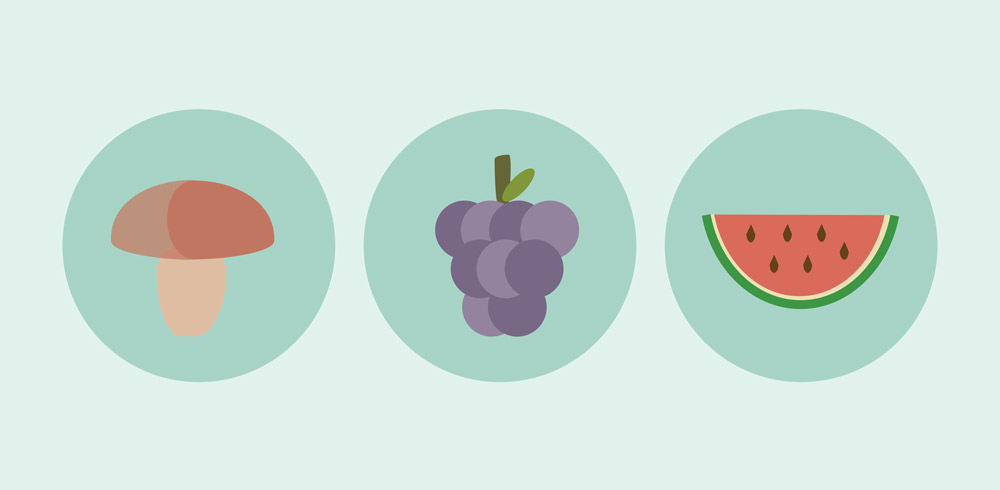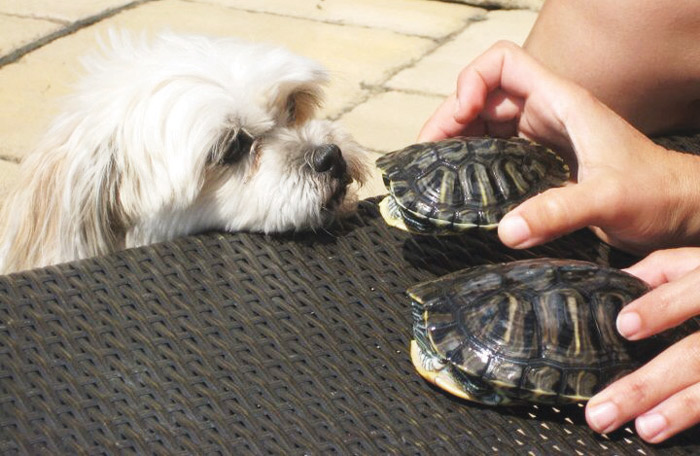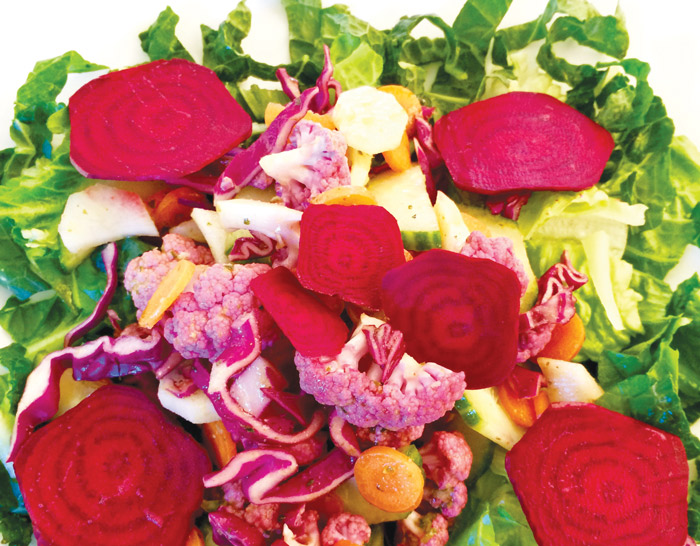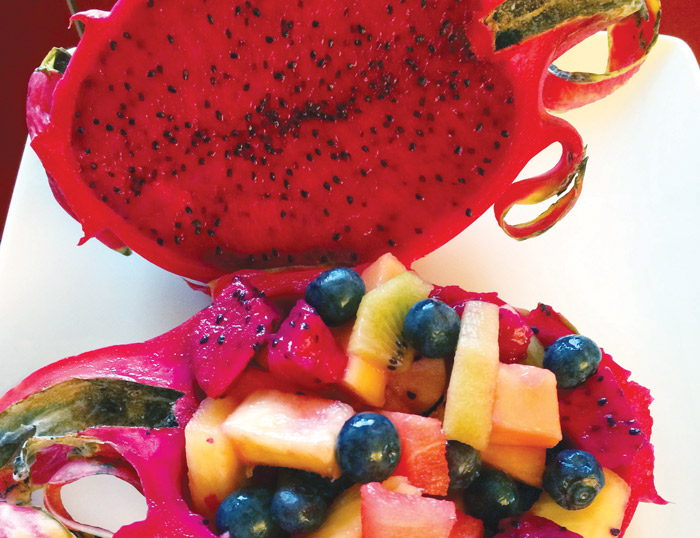


Domitille Biehlmann for The McGill Tribune
My transition into a vegan diet has been anything but easy. The skeptical remarks that I received from some of my family members made me second guess my decision. The thought that I was making things harder for other people who had to accommodate my new diet created a small fragment of doubt in my mind. I started to wonder if my reason for transitioning was justified.
I decided to become vegan because of my love for animals. Growing up, I had all kinds of pets: Gerbils, canaries, fish, turtles, dogs, and a lovebird-my mom calls our house a zoo. It was only a matter of time before I decided that I couldn't handle the idea of animals being slaughtered by the truckloads-just to feed us.

My pet turtles with my dog: Rosie. Areni Nicoghosian for The McGill Tribune
Because of my ethical motivation for becoming vegan, I do not make exceptions-such as eating meat for special occasions-which makes things inconvenient for my family. Consequently, the stereotype of 'vegans being difficult' often comes into discussion.
The idea that vegans are demanding or difficult is often reinforced by how they are portrayed in the media. For instance, many vegan or vegetarian characters in television and movies follow the stereotype of being stubborn and dogmatic about their choices.
One of the most well-known depictions of this tendency occurs in 'The Simpsons' episode, "Lisa the Vegetarian." In this episode, after choosing to become a vegetarian, Lisa sabotages her family's barbecue because she is against eating meat.
The preconceived bias that vegans are condescending about their lifestyle choices and aggressively try to change other people's diets to fit their views is also perpetuated heavily in social media. There are countless videos on YouTube, Facebook, and Instagram of comedians poking fun at vegans and criticizing them based on certain prejudices. These videos, although often sarcastic, portray vegans as judgmental and self-righteous.
Some people like to avoid the label 'vegan', because of the negative connotations surrounding the word. For example, Shunan Zhao Gao, a U3 International Development Studies student, who has been a vegan for four years, prefers instead to describe her lifestyle with the term /plant-based diet'.
"When people ask you, 'Why are you vegan?' I don't like to use this label," said Zhao Gao. "Well, I mean, it is quite complicated to say I don't eat meat, seafood, eggs, and dairy. So, you just use the label 'vegan', right? But then there is a negative connotation to it. I don't like to label myself this way [...] so, [I] just use the word plant-based."
Zhao Gao believes that judgmental vegans are the exception rather than the rule, and so she tends to avoid heated arguments about veganism.
"Some vegans like to judge people," Zhao Gao said. "While others are like, 'You can eat whatever you want, it's none of your business if I eat vegetables or not, or whether I eat meat or not."
Jessica Cangul, a U2 Film Studies student at Concordia who has been practicing veganism for a few years because of animal rights concerns, believes that the stigma surrounding the term is the consequence of a loud minority of vegans.
"I feel like [some] vegans in the media give regular, everyday vegans a bad [reputation] because they generally do not encourage meat eaters [instead of] showing them vegan alternatives and their benefits," Cangul explained. "Instead they attack them and call them out on their values. [....] Ergo, meat-eaters see all vegans as being one. Meanwhile, there [are] a multitude of different types of vegans."
Since the start of my transition, I thankfully have not experienced any particularly negative reaction from others. My friends, most of whom are vegan, were very supportive. My mom also changed her diet with me, making things easier at home. However, some family members didn't agree with my choices, calling me 'weird' and 'difficult,' although they didn't directly tell me not to be a vegan.

A salad my mom made out of lettuce, kale, beets, purple cauliflower and carrots. Areni Nicoghosian for The McGill Tribune
"I just don't usually agree with 'hardline' ways of thinking," my brother said. "Why not eat vegan 99 per cent of the time, but once in a while enjoy a hamburger at a BBQ or a bowl of spaghetti and meatballs?"
Making exceptions is easier said than done, especially when the decision to become a vegan is rooted in ethical beliefs. Regardless, he doesn't view veganism in an entirely negative light, as he considers it as a potentially beneficial diet.
"I think it can be a healthy lifestyle if you can replace everything you stopped eating with good alternatives," he said.
On the other hand, my father doesn't fully agree with veganism because he believes that meat and animal byproducts are essential for a healthy and balanced diet.
"I completely agree that cruelty for animals should not be part of the consumption process," he said. "I view [veganism] positively, but I do not agree with it a hundred per cent. There are compromises that can present proper solutions to the way the consumption cycle functions."
Although they didn't necessarily agree with them, my family ultimately respected my choices. I initially thought that my brother and father didn't approve of my choices because they had preconceived biases about vegans. After talking to them, however, I realized that this wasn't the case; I actually stereotyped them as skeptical meat eaters instead of understanding their true reasons for not agreeing with the lifestyle.
The stereotype that all vegans are judgmental does not explain the whole truth about the plethora of types of vegans in the world. At the same time-despite what vegans sometimes presume-not all meat-eaters blindly criticize vegans.
In fact, some meat eaters, like Sananne Wartabetian, a U3 Translation major at McGill, actually commends vegans for their dedication.
"I completely understand why they're doing what they're doing!" Wartabetian said. "I think it's not easy to have that kind of lifestyle, but that it must be rewarding for them."
Having never experienced the stereotypical judgmental vegans, Wartebetian believes that the few overbearing vegans determine some people's views on veganism.
"I think that some vegans can get annoying with their discourse on the importance of their eating habits," she said. "And [these people] can become a little preachy, so people are generally annoyed when they hear about veganism."
One way to avoid preconceived notions about vegans is to gain a better understanding of their motivations. In addition to health-related and ethical reasons, environmental considerations may also be a factor in a person's decision to become vegan. This was the case for Victoria Lecker, a U3 International Development Studies student at McGill.
"I already knew that [consuming meat and dairy] was bad for the environment, for [both] the animals and us," said Lecker. "But it was hard to [switch] when living with my parents. In 2013, I started out eating vegetarian for lunch because it was easier. Eventually, I stopped eating meat for supper. By 2016, I tried to be as vegan as possible."
Lecker believes that everyone will ultimately have to become vegan to protect the environment.
"I think that [with] the state of the world, [and] everything that is going on, cultures have to change and adapt in order to ensure that our world is okay," she explained. "Eventually we all have to change-we won't have a choice."
This belief is grounded in data which suggests that the meat production industry has a significantly negative toll on the environment due to its high production of green-house gases , overuse of antibiotics on livestock, and intensive usage of land and water resources.
According to a 2010 report by the International Resource Panel, hosted by the United Nations Environment Programme, people will need to adopt a more plant-based diet in order to lower the detrimental impact of producing meat and animal byproducts. The report states, "a substantial reduction of impacts would only be possible with a substantial worldwide diet change, away from animal products."
Additionally, according to Global Footprint Network, humans are using resources at an unsustainable rate. Using United Nations scenarios, the Network speculated that if we do not change our environmental practices, we would need two planets by 2030 to sustain ourselves.
Needless to say, not every vegan believes that their diet should be universal, nor are they all environmentally-focused.
Zhao Gao grew up on a vegetarian diet, making her transition to veganism a relatively easy one. Her choice for adopting a vegan diet was because of its health benefits.
"I went to the big library, the one at Berri-UQAM, and I took a book [....] it was a health book, called The China Study," she said. "The arguments in [it] were pretty convincing. After reading the book, I slowly started getting into it."
The China Study by T. Colin Campbell and his son Thomas M. Campbell examined the correlation between chronic illnesses and consumption of meat versus plant-based diets. The study showed that those who ate a vegan diet had a reduced rate of chronic illnesses.
Although there is not enough data to conclude that a vegan diet is overall healthier than a traditional omnivorous diet, there are many other studies which present evidence for different health benefits of adopting a plant-based diet. For example, it has been found that vegans generally have lower blood pressure and cholesterol levels than meat eaters, which puts them at a lesser risk of cardiovascular diseases.
Despite this, concerns and doubts about the nutritional viability of plant-based diets are discussions that vegans and vegetarians are often unwillingly swept into. Some people believe that if one doesn't eat meat and dairy, one is missing out on important nutritional elements.
"The reactions I got were supportive, but critical at the same time," explained Cangul. "People felt like veganism was too extreme and that the better diet was vegetarianism. They thought that I would be lacking nutrients and missing out on milk, and cheese, and egg because they enjoyed it and assumed that I would be restricting myself from what they take pleasure in."
There is evidence which suggests that vegans are generally more susceptible to deficiencies in vitamin B12, iron, and zinc. It is also a common concern among non-vegans that there are not enough plant-based sources of protein.
Thus, there are some studies that recommend against a strictly vegan lifestyle. However, as long as vegans understand exactly what nutrients they need, there are countless plant-based alternatives for meat.
Sometimes, the decision to avoid plant-based diets is grounded in the desire to preserve tradition. Cangul, who comes from a Mediterranean and Middle Eastern background, could not change her diet at a younger age due to her culture's heavily meat-based diet.
"My parents never considered cooking vegetarian or vegan alternatives," she said. "There was a traditional way of cooking things, and it was always with meat. For example, my mom would have never made vegan burgers; burgers were made with meat."
Nowadays, vegetarian and vegan alternatives are gaining popularity, even among meat eaters. A growing number of restaurants include veggie or even vegan burgers in their menu, using mushrooms, mixtures of grains, beans, and various vegetables in place of meat.

A fruit salad containing dragon fruit, kiwi, apple, blueberries, oranges and pineapple. Another one of my mom's creation Areni Nicoghosian for The McGill Tribune
For students who are transitioning to veganism, it is important that dining services have options to fit different diets.
"I find it really progressive that [Concordia University] is making an effort in introducing the vegan diet to all students," said Cangul. "It promotes dialogue and encourages students to seek plant-based options with their diet. If there is a vegan option, it doesn't prevent the meat eater from eating it; however, when the tables are turned, the same cannot be said for vegans, and [reduces] their importance as fellow students."
While there are some vegan options at McGill, they are spread out in various locations throughout campus, making it challenging for everyone to access.
"I'm kind of happy with what we have, but maybe [they should] put some of the [Royal Victoria College Dining Hall] food in more locations," said Lecker, who found a lot of vegan alternatives there.
Most commuting students bring their own food from home rather than buying it on campus.
"I always bring my food because I don't want to spend my money on that and also because I don't really have the time to go out to eat," said Zhao Gao. "And vegan food is usually expensive."
Ultimately, despite some of the hurdles I experienced during my transition, it has been a rewarding journey. Because I have fortunately been surrounded with understanding people who encourage me to be myself, I am able to maintain a diet that has had a positive effect on my life. As a result, I have been able to find a diet that suits my individual preferences. Everyone has their own reasons for the dietary choices that they make, whether it is deciding to eat animal products or to avoid them. Whatever people decide to eat, they should be able to do so free of judgment.